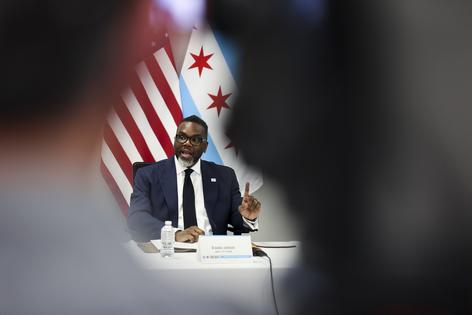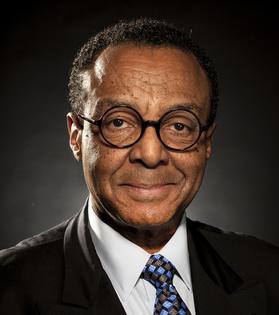Let’s Take Advantage of the Crime Downturn to Learn What’s Gone Right
Will Donald Trump have Chicago to kick around anymore?
That question, an update of Richard Nixon’s memorable farewell to news reporters as he dropped out of the California governor’s race in 1962, came to mind on the heels of some unusually welcome news about violent crime in Chicago.
The city finished April with only 20 reported murders, according to a WBEZ analysis. That’s the lowest count of any April since 1962.
Also, the public radio station found that the city’s "116 murders through this year’s first four months mark the lowest January-through-April tally since 2014."
Even as the city braces for its usual summertime surge in violent crimes, it still appears to be on pace to hit Mayor Brandon Johnson’s 2025 goal of having fewer than 500 murders for the first time in a decade.
Meanwhile, is Washington tuned in to the good news — and how we can have more of it?
President Trump‘s historic blizzard of executive orders in the last of his first 100 days in office for this term poked his presidential nose back into Chicago’s affairs in the very moment when good news is happening without him.
Three of his executive orders in particular seemed to be aimed at Chicago.
One seeks to end all federal consent decrees governing police conduct.
That would include Chicago’s agreement which dates back to the fatal shooting of Laquan McDonald, 17, by Chicago police officer Jason Van Dyke in October, 2014.
McDonald died after Van Dyke pumped 16 9mm bullets into him. In 400 pages of reports, police had claimed that McDonald was acting "crazed" while walking down the street and had lunged at officers after refusing to drop a knife, leading department supervisors to rule the homicide justifiable.
Video of the incident released later showed that McDonald was walking away. Van Dyke was convicted of second-degree murder, and Chicago and the U.S. Department of Justice signed a consent decree to address the underlying civil rights issues of the case.
A second executive order by Trump calls on state and federal officials, as WBEZ reported, to "publish lists of jurisdictions often called sanctuary cities that limit cooperation with federal officials' attempts to arrest immigrants who are in the country illegally."
That sounds like Chicago’s Welcoming City Ordinance. First declared by Mayor Harold Washington in 1985 via executive order, it aims to ensure undocumented residents are not prosecuted "on the basis of immigration status."
Yet another order signed by Trump would increase access to excess military equipment by state and local officials. It would also increase legal support for officers accused of wrongdoing while on official duty.
Although I believe in supporting law enforcement, the use of military equipment by local departments opens up another long-running debate about the wisdom and effectiveness of militarizing local police, as it could lead to unnecessary use of excessive force on, for example, political protesters.
Finally, Trump signed an order reinforcing an existing federal law that requires English-language proficiency for commercial motor drivers. That doesn’t sound too drastic, but I’m curious about how a Republican president whose party usually emphasizes local solutions for local problems is so eager to stick Washington’s nose into this one.
Amid these executive orders, will Trump and his MAGA movement notice the good news happening on Chicago streets and other big cities?
Is it possible that Trump and MAGA have drawn so much political mileage out of the crime-ridden-hellhole narrative about Chicago to be deterred by mere facts?
“Chicago is a shooting disaster,” Trump tweeted way back in August 2013. “They should immediately go to STOP AND FRISK. They have no choice, hundreds of lives would be saved!”
“Stop and frisk” policies also are very controversial, yet popular among those who first hear about it. Which reminds me of a wise saying of H.L. Mencken that Ronald Reagan loved to quote: “For every problem, there's a solution that's neat, plausible and wrong."
Trump’s tireless tweeting often brings that to mind.
To find real solutions requires more careful examination than you are likely to hear from the next bar stool.
My years of covering crime and other problems in Chicago’s communities have shown me how a lot of street savvy and dedicated professionals and volunteers at the grass-roots neighborhood level have been the unsung heroes that lead to safe and peaceful communities, if we give them a chance.
We can learn a lot from such apparent successes as community violence intervention, or CVI, programs. They hire ex-offenders to mediate gang conflicts and steer high-risk individuals to social services and jobs.
Such programs won’t end all of our urban crime problems, but I’ve seen a promising number of examples that have produced positive results.
Can the answers to our urban crime problems be found on the same streets that produced them? It’s worth a try.
Either way, it’s better than turning our neighborhoods, whose residents want to live in peace and safety, into an escalating combat zone.
========
(E-mail Clarence Page at clarence47page@gmail.com.)
©2025 Tribune Content Agency. Distributed by Tribune Content Agency, LLC.
(c) 2025 CLARENCE PAGE DISTRIBUTED BY TRIBUNE MEDIA SERVICES, INC.


























Comments